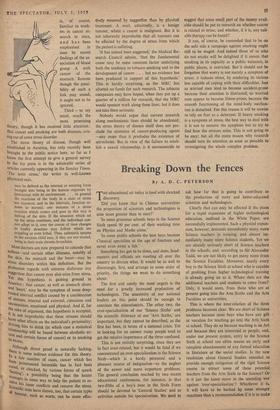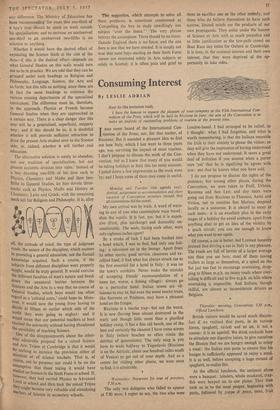Breaking Down the Fences
By A. D. C. PETERSON Tar educational air today is loud with shocked discovery. 'Did you know that in Chinese universities the proportion of scientists and technologists is nine times greater than in ours?'
'In some grammar schools boys in the Science Sixth spend 9,0 per cent. of their working time on Physics and Maths alone.'
'In some public schools the best boys become Classical specialists at the age of fourteen and never even enter a lab.'
Something has got to be done, and dons, head- masters and officials are meeting all over the country to discuss what. It would be as well to disentangle, first, and arrange in some order of priority, the things we want to do something about.
The first and surely the most urgent is the need for a greatly increased production of technologists. The unanimity of our national leaders on this point should be enough to convince the educationists. The other two, the over-specialisation of our 'Science Sixths' and the scientific illiteracy of our 'Arts Sixths,' are important, but they cannot be described, as the first has been, in terms of a national crisis. Yet in looking for an answer many people tend to get the relative importance of the three confused.
This is not entirely surprising, since they are in fact inter-related, but it would be fatal if we concentrated on over-specialisation in the Science Sixth—which is a hardy perennial and a pleasant source of indignation—to the neglect of the newer and more important problems. The general conclusion reached by two recent educational conferences, for instance, is that two-fifths of a boy's time in the Sixth Form should be devoted to 'General Studies' and to activities outside his specialisation. We need to ask how far that is going to contribute to the production of more and better-educated scientists and technologists.
Clearly that can only be effected if the plans for a rapid expansion of higher technological education, outlined in the White Paper, are successfully implemented. Such a physical expan- sion, however, demands immediately many more Science teachers in training, and almost im- mediately many more Science students. Yet we are already seriously short of Science teachers in the schools, and, according to Sir Alexander Todd, we are not likely to get many more from the Science Faculties. Moreover, nearly every boy in the Science Sixth at school who is capable of profiting from higher technological training is already going on to it. Where then are the additional teachers and students to come from? Only, it would seem, from those who are at present going into the Arts Sixths and the Arts Faculties at universities.
This is where the inter-relation of the three problems becomes clear, We are short of Science teachers because most boys who have any gift or vocation for teaching go into the Arts Sixth at school. They do so because teaching is an Art and because they are interested in people; and, under our present system, entry to the Science Sixth at school too often means an early and complete abandonment of any formal education in literature or the social studies. Is the new resolution about General Studies intended to provide enough mitigation of the rigid Science course to attract some of these potential teachers from the Arts Sixth to the Science? Or is it just the latest move in the unending war against 'over-specialisation'? Whichever it is, it will have to be backed by some stronger sanctions than a recommendation if it is to make any difference. The Ministry of Education has been 'recommending' for years that one-third of a boy's time should be spent on work outside his specialisation; and to increase an unobserved one-third to an unobserved two-fifths is no solution to anything.
Whether it would have the desired effect of expanding the Science Sixth at the cost of the Arts—if this is the desired effect—depends on what General Studies on this scale would turn out to be in practice. We are told that they can be grouped under such headings as Religion and Philosophy, Language, Science, the Arts and so forth; but this tells us nothing, since these are in fact the same headings as embrace the various existing departments of the specialised curriculum. The difference must lie, therefore, in the approach. Physics or French become General Studies when they are approached in a certain way. There is a clear danger that this way will be a generalised, superficial, snippety way : and if this should be so, it is doubtful whether it will provide sufficient attraction to draw the present Arts student over to the Science side; or, indeed, whether it will further _ real education.
The alternative solution is surely to abandon, not our tradition of specialisation, but our present eccentric division into 'sides.' Instead of a boy devoting one-fifth of his time each to Physics, Chemistry and Maths and then two- fifths to General Studies, let him devote three- tenths each to Physics, Maths and History or Chemistry, Latin and Greek, with the remaining tenth left for Religion and Philosophy. It is, after all, the attitude of mind, the type of judgment made, the nature of the discipline, which matters in providing a general education, not the factual knowledge acquired. Such a course, if the subjects from different disciplines were properly taught, would be truly general. It would exercise the different faculties of man's nature and break down the unnatural barrier between the Sciences and the Arts in a way that no course of General Studies, which boys would too often regard as a 'cultural extra,' could hope to. More- over, it would save the young from having to decide at fifteen or earlier which side of the world they were going to neglect : and it Would mean that our potential teachers at least reached the university without having abandoned the possibility of teaching Science. One of the disappointments about the other- wise admirable proposal for a mixed Science and Arts Tripos at Cambridge is that it would do nothing to increase the provision either of scientists or of science teachers. That is, of Course, not its purpose; nor could it be on the assumption that those taking it would have studied no Science in the Sixth Form at school. If, however, they had carried Physics to Advanced Level at school and then took the mixed Tripos they might become very valuable and stimulating teachers of Science in secondary schools. This suggestion, which attempts to solve all these problems, is sometimes condemned as 'Compelling the boy to study unwillingly one subject "over the fence."' The very phrase betrays the assumption. There should be no fence. Outside England there is no fence, and the one here is one that we have erected. It is simply not true that most boys starting on their Sixth Form career are interested solely in Arts subjects or solely in Science; it is often pain and grief to
them to sacrifice one or the other entirely; and those who do believe themselves to have such narrow, limited minds are the products of our own propaganda. They enlist under the banner of Science or Arts with as much prejudice and as little justification as the tow-path crowd on Boat Race day enlist for Oxford or. Cambridge. It is time, in the national interest and their own interest, that they were deprived of the op- portunity to take sides.















































 Previous page
Previous page